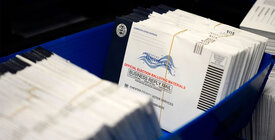
Federal and State Election Laws Ban Federal Forces from Polling Places
Americans should feel safe to vote free from intimidation by the presence of the military or federal agents.

Part of
President Trump has alluded to the idea of deploying federal agents to election locations, and several of his prominent supporters have dropped similar hints. His deployment of federalized National Guard soldiers to several cities has heightened concerns about election interference. But can the president send troops or ICE agents to polling places? No — both federal and state laws explicitly prohibit the federal government from carrying out these implied threats.
It is a federal crime for the military or federal agents to interfere in elections or intimidate voters.
The law is crystal clear: It is illegal to deploy federal troops or armed federal law enforcement to any polling place. In fact, it is a federal crime for anyone in the U.S. military to interfere in elections in any way. More specifically, it is a crime, punishable by up to five years in prison, to deploy federal “troops or armed men” to any location where voting is taking place or elections are being held, unless “such force be necessary to repel armed enemies of the United States.” The law, which dates back to the end of the Civil War, originally also allowed troops at the polls when necessary to “keep the peace,” but that exception was removed more than 100 years ago.
This means that the current administration can’t justify sending federal forces to polling places by claiming that state and local police are simply failing to maintain order, as it has done to defend its other deployments of the National Guard.
It is also a federal crime for anyone, including federal agents, to intimidate voters. Anyone who does so may be liable for a number of different federal criminal offenses.
No emergency powers allow the president to override laws protecting elections and voters.
A presidential declaration of national emergency unlocks powers contained in 137 different laws, but none gives the president authority over elections. Even the Insurrection Act, which is the most potent of the president’s authorities to deploy the military domestically, does not permit troops deployed under the law to take illegal actions — which would include interfering in elections.
Of course, the current administration has taken a number of actions that violate the plain letter of the law or the Constitution, such as ordering the end of birthright citizenship or retaliating against law firms for their speech. And given the recent politicization of the Justice Department, it’s reasonable to doubt whether the administration’s own lawyers would pursue charges related to a deployment ordered by the president. But these crimes are subject to a five-year statute of limitations, so anyone who complies with such an order could still face prosecution in the future.
Voters and election workers can go to federal court to stop intimidation.
Even if voters can’t depend on the Justice Department to prosecute crimes, there are various other state and federal legal safeguards that protect voters that are enforceable by state officials or voters themselves.
Anyone intimidated from voting by the presence of ICE agents or soldiers could ask a judge to block such intimidation under the Voting Rights Act of 1965 or a number of other federal provisions. The Voting Rights Act also protects people “urging or aiding others to vote” from intimidation, so election officials, poll workers, and organizers and volunteers working to get out the vote could also bring such a lawsuit. Under the Voting Rights Act, the person bringing the suit only has to prove that they were intimidated, not that the person they’re suing intended to intimidate them.
State laws provide voters additional protection with criminal laws and the ability to file lawsuits.
In addition, every state’s laws outlaw voter intimidation, typically by making it a crime. Many states also prohibit carrying guns at or near polling places, drop boxes, or other election facilities. These prohibitions often contain exceptions for state law enforcement, but they don’t always exempt federal law enforcement or troops. Federal actors may have a defense against state criminal prosecution if they are carrying out their legal duties. For that reason, state prosecutions of federal officials doing their jobs are rare. But by definition, committing a federal crime cannot be part of their legal duties. There would therefore be a powerful argument that they are subject to prosecution for state crimes. These charges would be brought by state and local prosecutors, who are independent of the federal government.
A few states also have protections against intimidation in elections that parallel the federal protections by allowing voters and others to bring lawsuits. These state law protections may provide additional relief, such as the ability to recover damages from the intimidating actor. And in California and Colorado, the state laws create a presumption that someone carrying a weapon near protected election activity is intimidating. (While that presumption does not apply to state law enforcement officers, it would apply to federal agents.)
Courts would likely act swiftly against any armed federal deployment to interfere with elections.
These specific legal protections for elections provide an even stronger basis for courts to take action than in other suits challenging federal deployments. A number of the administration’s deployments of the National Guard and the military, as well as certain tactics used by ICE in raids — outside the context of elections — have been challenged in federal court. In several cases, judges have issued orders limiting or prohibiting challenged conduct. But the use of armed federal forces around elections would be even more blatantly illegal than those previous actions, and any attempt to do so would therefore likely prompt rapid action by the courts. It would also create the potential for criminal and financial liability for those involved.
• • •
Americans should not let the recent deployment of federal forces on city streets deter them from participating in elections. As always, voters should make a plan to vote and take time to understand all the voting options available to them, whether that means voting early, voting by mail, using a drop box, or going to the polls on Election Day. And they should vote with confidence: The law is on their side, and the experience will likely be as smooth and secure as it has been in the past.
More from the Explainers collection
-
Preclearance Under the Voting Rights Act
For decades, the law blocked racially discriminatory election rules and voting districts — and it could do so again, if Congress acts. -
NATO’s Article 5 Collective Defense Obligations, Explained
Here’s how a conflict in Europe would implicate U.S. defense obligations. -
Facts and Myths About the Uniformed and Overseas Citizens Absentee Voting Act
Military personnel, aid workers, and other Americans living abroad have a right to vote, and there is a secure system that lets them do it.



